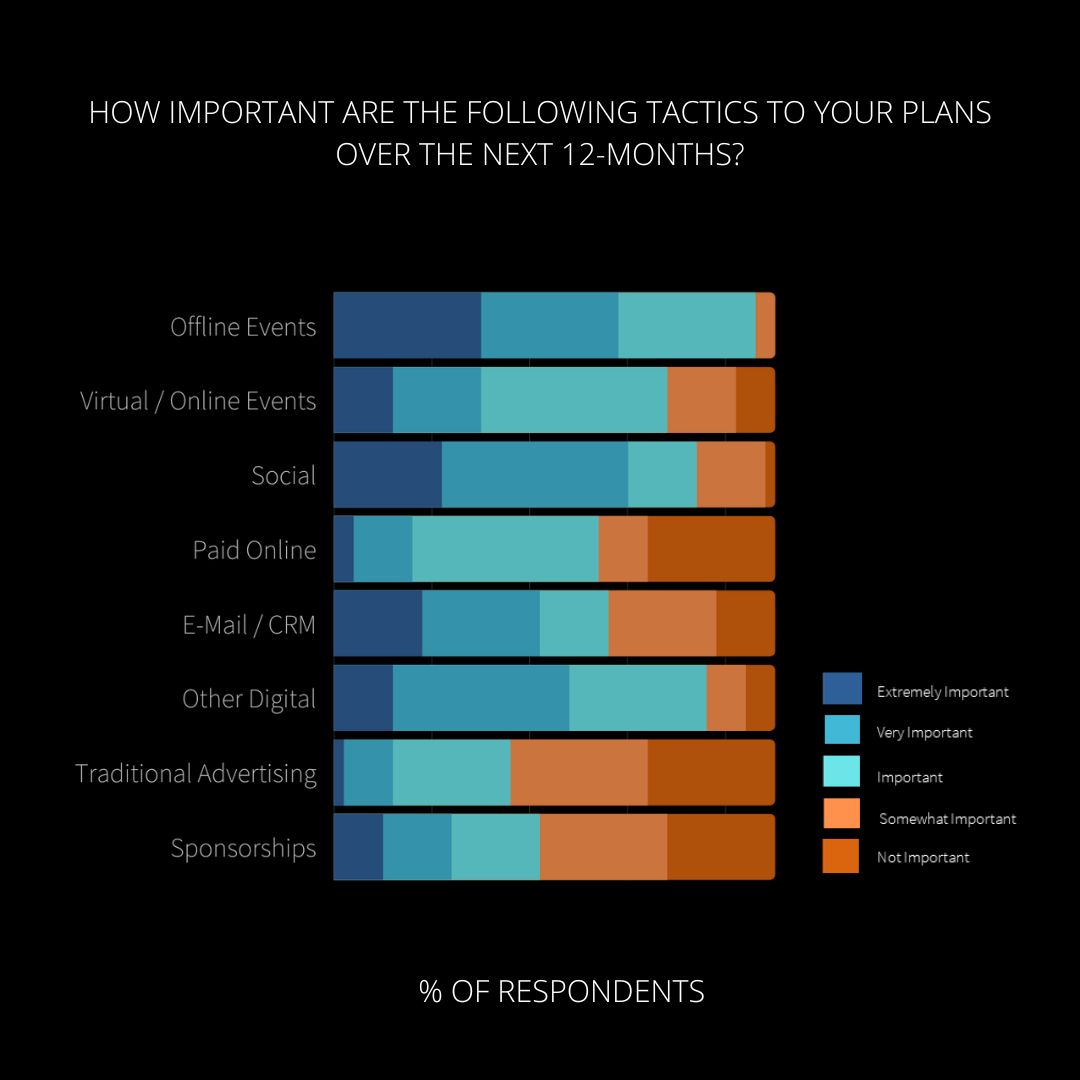
Survey: A snapshot of how businesses are approaching everything from the metaverse to data analytics
Conducted between April and July, Pico Group’s Annual Market Survey 2022 elicited the opinions of respondents – including executives (20%), directors (31%), managers (47%) and others (2%) – from a wide variety of sectors across the globe. Their answers reveal what’s happening right now with businesses’ investments in event types, new technologies such as metaverse, data analytics, sustainability and more. The results also paint a compelling picture of underlying trends in brand and experiential marketing.
Five key takeaways from the survey:
- Planners have missed ‘in-person events’
From the responses, it was evident that with health restrictions being lifted in most markets, brands were piling back into in-person or live events.
More remarkable are the following points:
- In-person events are more important in 2022 (64% of respondents ranked them as ‘extremely important’ or ‘very important’) when compared to even pre-COVID times (45%).
- NO respondents said they were ‘not important’.
- It seems that this has come at the expense of purely virtual events; respondents who ranked virtual events as ‘extremely important’ or ‘very important’ dropped by 39 percentage points year-on-year.
The ability to meet with audiences in a live setting has been missed. However, brands are being cautious in these uncertain times. They are planning in a way that allows them to be agile to macro-environment changes. In other words, they are planning hybrid.
- Hybrid is not an event, it is convergence
While many respondents placed a lower importance on virtual events, a significant number are making hybrid events a clear part of their plans; 47% said hybrid events are ‘extremely important’ or ‘very important’ to them over the next 12 months.
But what exactly is ‘hybrid’? Though it can be seen as a nebulous term, what is certain is that hybrid events focus on interaction of physical and digital worlds. There has also been so much focus and effort directed into this space that many people are probably acting hybrid without even calling it hybrid.
When we explored the importance of different digital platforms to brands, what their hybrid toolkits already contain – or are in the process of acquiring – was quite clear:
- 62% of respondents said that virtual/hybrid event platforms were a critical component of their hybrid toolbox, or that they were ‘exploring/looking to increase’ their use.
- 73% of respondents said that interactive videos were a critical component of their hybrid toolbox, or that they were ‘exploring/looking to increase’ their use.
- 60% of respondents said that XR was a critical component of their hybrid toolbox, or that they were ‘exploring/looking to increase’ its use.
Also notable is how brands are exploring the use of chatbots or conversational marketing platforms and podcasts to increase audience engagement. It all shows how physical events and digital can converge in a hybrid way.
- We are continuing to embrace Digital Transformation
It is not just about today, but tomorrow. When respondents were asked about the metaverse:
- 47% were currently ‘exploring its potential’
- 13% had already ‘conducted some activity’
- 4% felt it ‘wasn’t right for their business’
The metaverse, which allows collaboration in virtual spaces, augments physical places or blends both, is certainly a hot topic. However, it is one that brands are only just starting to really explore and test.
Whether it is the creation of value, developing a sense of ownership with audiences, dealing with avatars, understanding the importance of accessibility via different devices, or simply the need to reimagine engagement, only now are we starting to benefit from the experience of those bold ones who were first to market.
What is certain is that the metaverse’s potential for disruption is real, so we will need to learn quickly.
A notable way to do so is YAOLAND, a new HTML5 metaverse platform. Cost-effective and suitable for brands in all industries, it is an immersive gamified virtual marketing platform that allows users to create digital avatars and explore different activation experiences and stories, collect NFTs and participate in gaming, socialising, shopping and other activities. Capitalising on the popularity and rapid development of the metaverse, Pico invested in and used its digital expertise and experience to develop YAOLAND, together with Net263 Ltd, and China Unicom subsidiary Shanghai Wocheng, capturing the limitless potential of the metaverse ecosystem in the China market.
- Data is an opportunity, but for many it is an opportunity cost
There is no doubt that people understand the importance and benefits of data. However, only 31% of our respondents were ‘comfortable with’ their current level of data analytics. So, what needs to be addressed before planners can turn data into genuine opportunity?
- 49% of respondents said accessing the right skillsets/resources was a challenge
- 38% said they didn’t have the time to execute data plans effectively
- 20% said they were budget-challenged
- 16% said that the relevant teams did not collaborate effectively to deliver on data’s promise
Each of these findings offers brands cues to where improvements can be made.
In view of the above market trends, Pico is expanding its data services into analytics, machine-learning and applied AI with the release of its proprietary ExQ™ Experience Analytics platform, which helps brands by making consistent comparisons of their brand experience performance cost-effectively.
AI-powered, ExQ™ Experience Analytics platform features a unique benchmark scoring system designed to bring data-driven decision making and measurement into the MICE and brick-and-mortar retail industries. It effectively measures, compares and optimises audience experiences to drive return on experience (ROE) and return on investment (ROI). To illustrate how the ExQ™ Experience Analytics platform helps users leverage first-party data to create experience scores and benchmarks, Pico has developed an ExQ™ Lite Calculator that lets users experiment with project variables and see their outcomes.
Calculate it now to generate actionable insights: exq.pico.com. Contact This email address is being protected from spambots. You need JavaScript enabled to view it. (This email address is being protected from spambots. You need JavaScript enabled to view it.) for a deeper dive into the potential of ExQ™.
- It costs to be sustainable
‘Purpose’, or how a brand contributes to society, is an important factor in consumers’ purchase decisions – particularly Gen Z consumers. It is also important to brands, with over 75% of respondents feeling that their marketing activities had put purpose into practice effectively.
So what are brands focusing on?
- 73% of respondents highlighted ‘advocating sustainability’ as a key part of their purpose. However, this also created challenges when delivering impact via the marketing layer.
- 58% focused on pursuing diversity/equality during brand activations
On the other hand, the challenges are many and complicated, with the single biggest is cost; 53% of respondents said the cost of being sustainable wasn’t aligned to their budget realities.
What are the solutions here? Put simply, industry and agencies have a key role to play by focusing on providing adequate solutions and delivering innovation at an affordable scale.
Learn more by downloading our Annual Market Survey here.